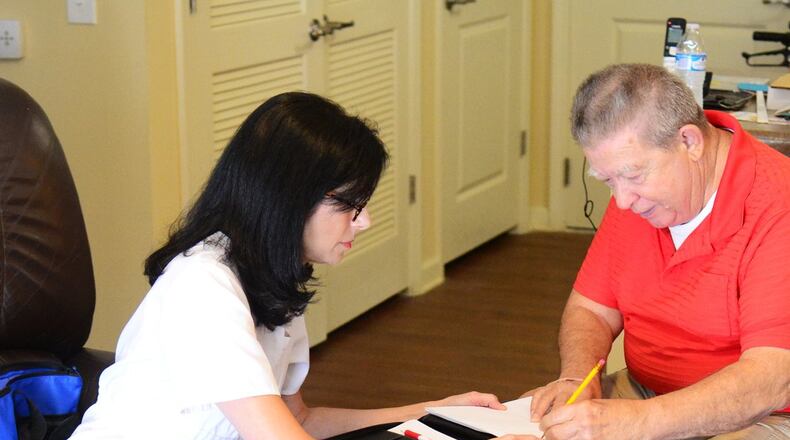dKarolyn Diamond-Jones hands her client a pencil, and he puts the lead to the paper in front of him.
“Now write a sentence. It can be about anything,” she said.
This may seem like a casual task, but Diamond-Jones is checking Tom Etheredge’s cognitive and motor function as part of a care assessment at his home in Gainesville. If he can write a sentence that makes sense she’ll know that he’s following mentally and that his hands are working well enough to form letters. Diamond-Jones, a Registered Nurse, also talks to his daughter, asks about his health history and his current ability to care for himself, and conducts a Mini Mental Status Examination.
These assessments take about two hours. Then Diamond-Jones goes back to the office at BrightStar Care of Cumming-Gainesville, an in-home care and medical staffing company, and turns in her recommendations for the client’s care.
“I feel like I’m using a lot of my skills in what I do, and I love it,” she says.
After graduating from Emory University’s nursing school in 1985 and returning to Emory 10 years later for her master’s in public health, Diamond-Jones worked mostly in a hospital setting before leaving the workforce to raise her kids — her eldest Nate, twins Harry and William, and her youngest, 14-year-old Darcy. She discovered that the patience required in parenting and nursing complement each other.
“I say I don’t know whether being a parent makes me a better nurse of if being a nurse makes me a better parent,” said Diamond-Jones.
After 13 years out of the job market raising her four children, Diamond-Jones got back into healthcare when she accepted a job as an assessment nurse with BrightStar in April 2016. Now she works contractually doing patient assessments for long-term care eligibility and access to benefits, a new area for her, but one in which she is using her skills.
“I really want to stay in patient care,” said Diamond-Jones. “I also have a master’s degree in public health so I have assessment skills, strong ones, and they felt that I would be a great fit for doing this.”
The job is particularly suitable, she said, since its flexible hours work for her lifestyle. A busy week can have four assessments, and a slower week has only one.
For each assessment Diamond-Jones goes over a patient’s health history and motor and mental functions. This includes assessing the client’s activities of daily living and having a client write a sentence to test motor skills and mental acuity.
She also tests judgment, asking questions like “Why is it dangerous to take a friend’s medication?” or “What would you do if you saw a fire on the stove?” These kinds of tests help her recommend the best course of action and amount of care for each client.
“We all know why they’re here, is that we either need to up the care or make some changes,” she said. “I try to let them know that whatever decision you make is right for you.”
This kind of work can be taxing, especially when a patient is going through a particularly rough patch, but Diamond-Jones said it’s also incredibly rewarding.
“I love it. I really do,” said Diamond-Jones. “Seniors know so much more than we do. They are so wise. They have such a gift of history and wisdom.”
Because she went through the process of home care when her mother’s health declined, Diamond-Jones feels she has a particularly strong empathy with her patients and their families.
“I understand what these adult children are going through,” she said. “That’s probably why I love doing this, and I feel I’ve been doing a good job at it.”
Plus, because she visits patients in their homes she gets to see new parts of Georgia, including beautiful north Georgia views.
“It’s like going on a little vacation every time I go to visit a client,” she said. “This is very therapeutic. I’m going to drive by a couple of lakes and over a mountain to visit someone in their home.”
Diamond-Jones, who previously worked in outpatient therapy and telemetry roles, is always looking for a way to make herself, her family and her patients healthier.
“I have a leaning towards preventative care,” said Diamond-Jones.
She experiments with essential oils and homeopathic remedies, and thinks many ailments can be handled with over-the-counter remedies, except for serious infections and injuries. For example, at a recent patient visit she talked to her client about getting outside in the sunshine for a bit every day to improve his skin and to soak up vitamin D.
“As long as I can help them and improve the quality of their lives and the situations they’re in, I like to be able to deliver that,” she said.
For healthcare professionals looking to change careers or return to the workforce, Diamond-Jones suggests looking at trends in your state and your community. Then consider how your skill set fits with current health care needs or new roles in the medical field. For example, she said nurse paralegal work, case managers and administration positions at senior centers are often overlooked avenues for nurses.
“Skills are pretty transferable,” she said. “Nurses don’t realize how versatile they are.”
About the Author
Featured

